Report about the story of 172 persons from Mali who were stranded in Agadez / Niger after being deported from Algeria and had big troubles with the way how the IOM handled their accomodation and their return to Mali.
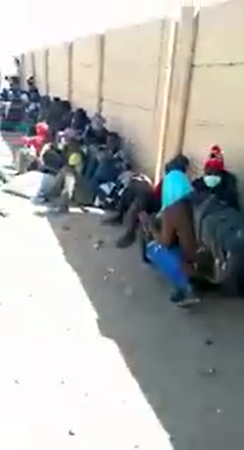
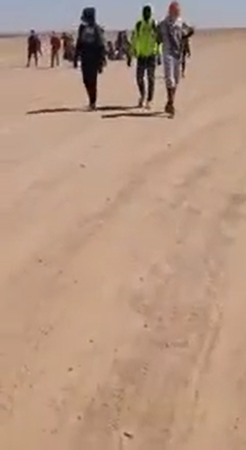
Despite all the hopes based on the year 2021, Algeria remains firm in its position to expel from its soil people from Sub-Saharan Africa. It is in this wake that a wave of 172 people of Malian origin found themselves on the soil of Niger in a so-called "unofficial" convoy. Placed under the responsibility of the International Organization for Migration (IOM), these people followed a dramatic journey that took almost a week to complete, and which ended up intriguing the Alarme phone Sahara (APS) network. More impression through the genesis of the facts:
IOM's responsibility
Once in Niger after their deportation from Algeria, migrants are placed under the responsibility of the IOM through its structures in Assamaka (Niger-Algeria border), Arlit and Agadez. The threat of the corona virus pandemic requires control tests and quarantine precautions. It appears that some are suspected to be Covid-19 positive and would have to undergo treatment while those certified negative would be subjected to treatment to avoid spreading the disease. In view of the principle of voluntary return, a charter flight is chartered for transport home. This is the beginning of the confusion that makes the issue a new and high-profile one.
At first, the Malian migrants refused to board the charter flight organised by the IOM, saying that they would not return to Mali without their sick comrades. The IOM then declared that it no longer felt responsible for the case of the Malian migrants. The person in charge of the transit camp where the IOM had placed them then told them to leave their accommodation.
As a result, men, women and children from the Malian community found themselves in the street a few hundred metres from the IOM camp in Agadez. A video gives an account of their living conditions. The Alarme Phone Sahara branch in Mali (their country of origin) took up the case and called on the Niger branch to engage themselves for a favourable outcome to the situation.
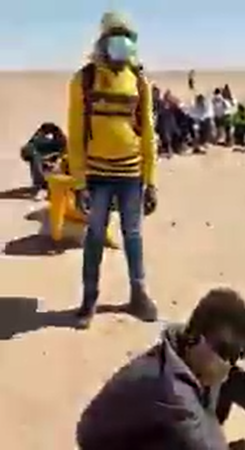
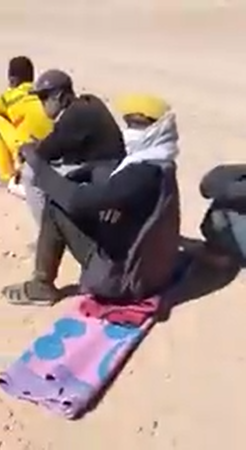
The involvement of APS Niger on behalf of Malian migrants
Once the Alarme Phone Sahara Agadez (Niger) coordination was reached by the Malian migrant's cry of distress, it started analysing the content of their video message broadcast in Bambara language. An investigation was initiated. Oumarou Maman Hadi, the Agadez Alarme Phone Sahara whistleblower, then proceeded to verify the facts reported by the Malian delegate.
Oscar Safari, head of the IOM Agadez sub-office, explains the background to the facts (ref. Audio and photos of the interviewee). Afterwards, the Alert Launcher meets the demonstrators positioned on the ground. Against all expectations, the interlocutors refuse to give their assessment of the facts. At the same time, however, some residents of the retirement district complained about living with travellers of different cultures and customs, going so far as to ask for the help of other community structures to free them from these unexpected neighbours. Faced with the new turn of events, the delegates initiated a letter of apology to the IOM in order to make it reconsider its position and find a solution for their case. This did not produce the desired effects. Another action by Alarme Phone Sahara beyond that of the whistleblower is therefore undertaken.
Members of the Alarme Phone Sahara (APS) coordination and Malian delegates in consultation
With the involvement of Sadio Diallo, himself a migrant and APS whistleblower, it was possible for the coordination of Alarme Phone Sahara to be on the retreat ground of the Malian migrants in view of a facilitation of their situation on 04th of February 2021. This gesture was fully appreciated by the Malian people, who suggest that their attitude, which has received a fair amount of media coverage, does not seek to discredit the IOM. In the same vein, they do not aim for a single moment to create diplomatic incidents between Niger and Mali. This justifies their letter to the IOM.
The Malians gave a telephone number to continue the exchanges. The delegation of Alarme Phone Sahara takes leave of the Malian delegates with an invitation for 20 people to the CommemorAction activities of 6th of February 2021 planned to be held at the APS office in Agadez to deepen the reflections. The day before CommemorAction, a telephone call to confirm their presence informs that they left the city of Agadez for Niamey on board buses mobilised by the Malian government according to well-informed sources. One of the Malian delegates promises to call back APS once they arrive in Niamey. This did not happen. At the moment, the interlocutor remains unreachable. Nevertheless, activists in Mali confirm the arrival of a group of Malian people who were in Niger after their deportation from Algeria.
Synthesis
International solidarity prevailed throughout the process in relation to the question of the return of the 172 Malian nationals deported from Algeria. The Alarme Phone Sahara Mali, Niger and Afrique-Europe Interact networks mobilised around the issue. While hoping for a quick recovery for the sick, the wish is to know that the large group has returned home safely. At the end of a telephone meeting of an APS body, it was agreed to associate the Malian activist structures for a follow-up of the return of the deportees from Mali in spite of all the incidents encountered.
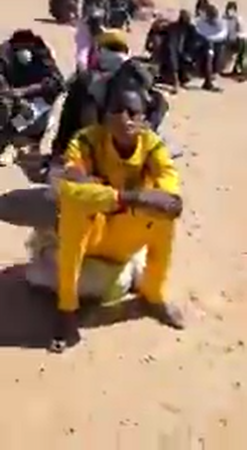
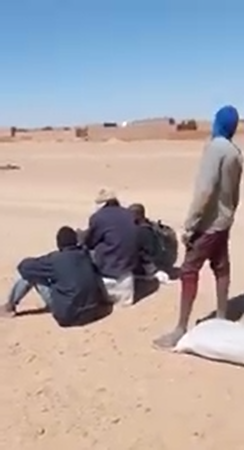
In addition, the case of the group of 172 Malians deported from Algeria to Niger shows:
⦁ The fact that Algeria continues to deport citizens from various African countries in so-called "unofficial" convoys to the Niger border, which puts them in great distress, is to be strongly condemned.
⦁ It is unacceptable that the IOM makes the accommodation and care of migrants dependent on their acceptance of a so-called "voluntary return".
⦁ If deported migrants want to return to their country of origin, as is the case with the group of 172 Malians, transport must be organised in dignified and transparent conditions, involving the people concerned and their needs, and not under conditions of imposition.
⦁ Even if all the 172 Malians were able to return to Mali, such situations risk to repeat themselves as long as people are deported to Niger and remain stranded there.

